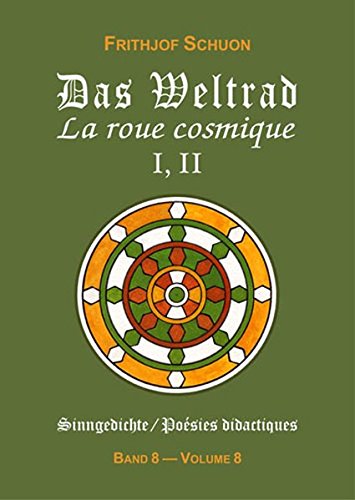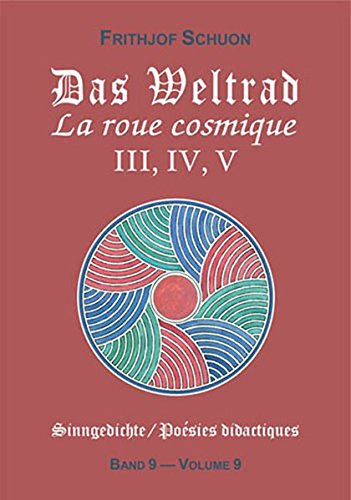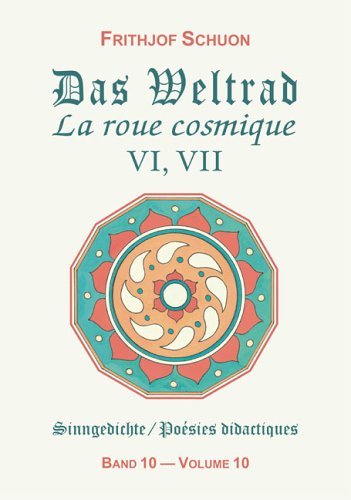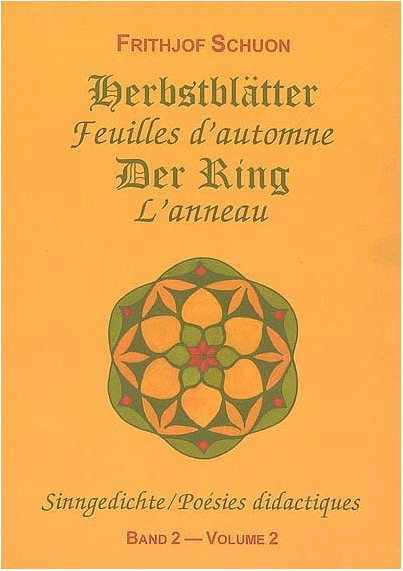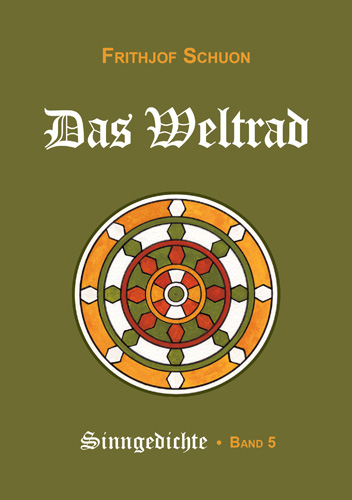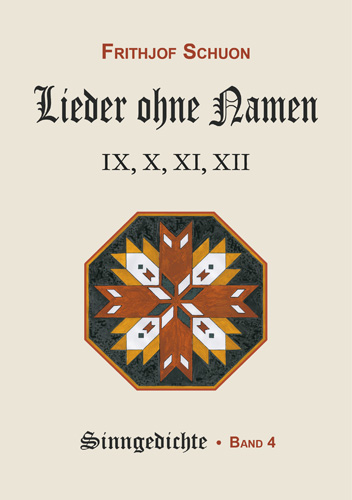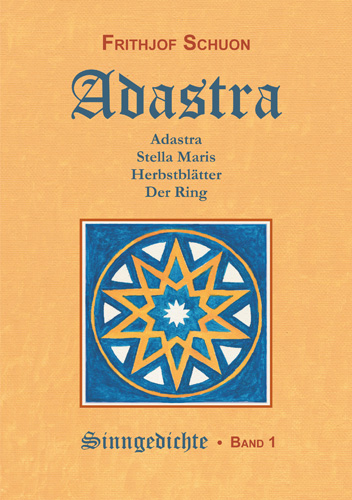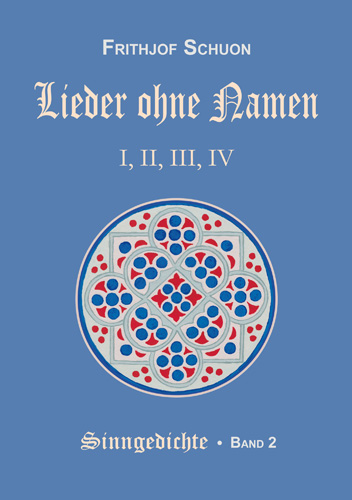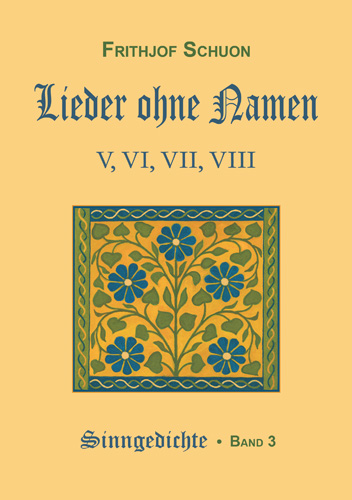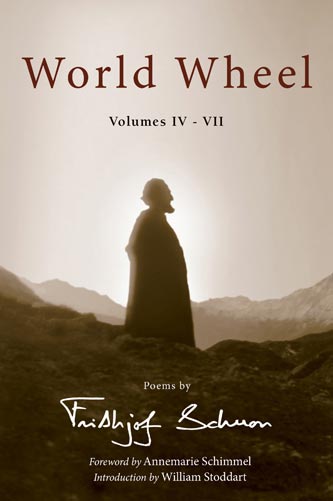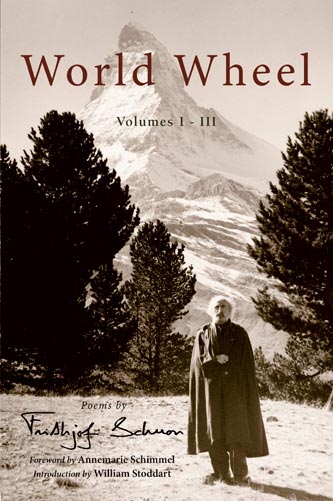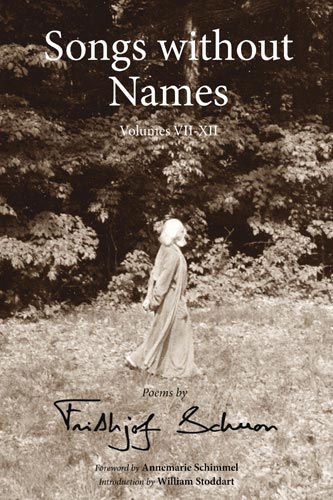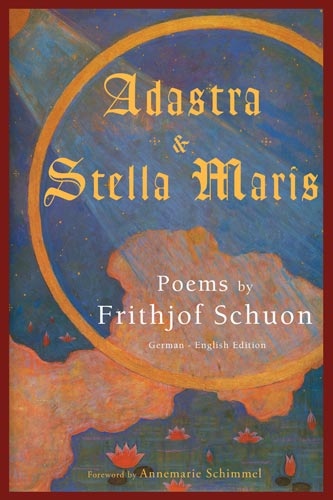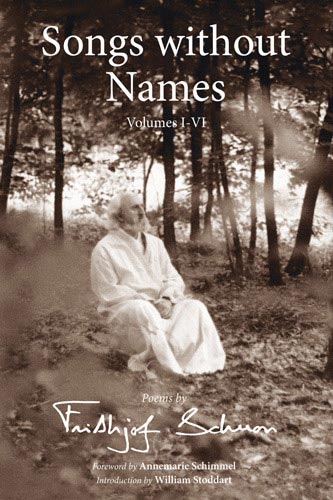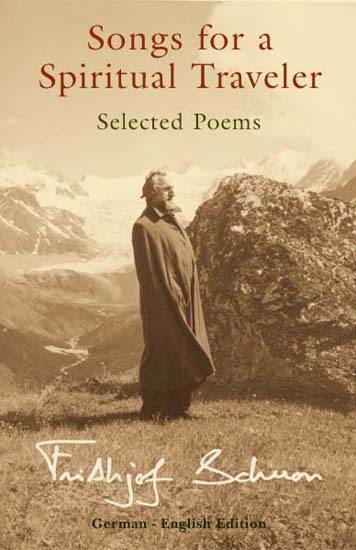
Frithjof Schuon Archive

Collections in Print
| Image | Title | Summary | Book Author | Book Subjects | Download | Price | hf:tax:book_subject | hf:tax:language |
|---|---|---|---|---|---|---|---|---|
| Das Weltrad 1, 2 | The German sense poems of Frithjof Schuon form a metaphysical and spiritual whole that unites the essential teachings of this master in a form that is both accessible and immediate. | Frithjof Schuon | Inspirational, Poetry | 35.84 | inspirational poetry | german | ||
| Das Weltrad 3, 4, 5 | The German sense poems of Frithjof Schuon form a metaphysical and spiritual whole that unites the essential teachings of this master in a form as accessible as it is immediate. | Frithjof Schuon | Inspirational, Poetry | 20.00 | inspirational poetry | german | ||
| Das Weltrad 6, 7 | As such, in their simplicity and directness, these poems may seem like a final mercy, a bit like a last lifeline thrown to us; mercy of a sage whose life and work can only be understood in the sign of giving, of conveying a core of certainty that is the key to happiness in this world and the next. | Frithjof Schuon | Inspirational, Poetry | 20.00 | inspirational poetry | german | ||
| Herbstblätter & Der Ring | The German sense poems of Frithjof Schuon form a metaphysical and spiritual whole that unites the essential teachings of this master in a form as accessible as it is immediate. | Frithjof Schuon | Inspirational, Poetry | 20.00 | inspirational poetry | french-2 german | ||
| Das Weltrad | The German sense poems of Frithjof Schuon form a metaphysical and spiritual whole that unites the essential teachings of this master in a form that is both accessible and immediate. | Frithjof Schuon | Inspirational, Poetry | 20.00 | inspirational poetry | german | ||
| Lieder ohne Namen IX-XII | The German sense poems of Frithjof Schuon form a metaphysical and spiritual whole that unites the essential teachings of this master in a form that is both accessible and immediate. | Frithjof Schuon | Inspirational, Poetry | 20.00 | inspirational poetry | german | ||
| Adastra | Frithjof Schuon’s German poems of meaning form a metaphysical and spiritual whole which unites the essential teachings of this Master in a form which is as accessible as it is immediate. | Frithjof Schuon | Inspirational, Poetry | 20.00 | inspirational poetry | german | ||
| Lieder ohne Namen I-IV | Frithjof Schuon’s German poems of meaning form a metaphysical and spiritual whole which unites the essential teachings of this Master in a form which is as accessible as it is immediate. | Frithjof Schuon | Inspirational, Poetry | 20.00 | inspirational poetry | german | ||
| Lieder ohne Namen V-VIII | Frithjof Schuon’s German poems of meaning form a metaphysical and spiritual whole which unites the essential teachings of this Master in a form which is as accessible as it is immediate. | Frithjof Schuon | Inspirational, Poetry | 20.00 | inspirational poetry | german | ||
| World Wheel: Poems by Frithjof Schuon Volumes IV-VII | A four-volume collection of spiritual poetry by Frithjof Schuon who wrote approximately 3,500 poems in his mother tongue German. | Frithhof Schuon | Inspirational, Metaphysics, Poetry | 22.00 | inspirational metaphysics poetry | english | ||
| World Wheel: Poems by Frithjof Schuon Volumes I-III | During the last three years of his life Frithjof Schuon wrote approximately 3,500 poems in his mother tongue German. | Frithjof Schuon | Inspirational, Metaphysics, Poetry | 22.00 | inspirational metaphysics poetry | english | ||
| Songs without Names: Poems by Frithjof Schuon Volumes VII-XII | During the last three years of his life Frithjof Schuon wrote approximately 3,500 poems in his mother tongue German. | Frithjof Schuon | Inspirational, Metaphysics, Poetry | 22.00 | inspirational metaphysics poetry | english | ||
| Adastra and Stella Maris: Poems by Frithjof Schuon | Adastra and Stella Maris: Poems by Frithjof Schuon represent the heart of Schuon’s German poems. These two books, combined in one volume, express, in the words of Annemarie Schimmel, “a mystery that lies beyond the normal human expression… | Frithjof Schuon | Inspirational, Metaphysics, Poetry | 19.95 | inspirational metaphysics poetry | english | ||
| Songs without Names: Poems by Frithjof Schuon Vol. I-VI | During the last three years of his life Frithjof Schuon wrote approximately 3,500 poems in his mother tongue German. | Frithjof Schuon | Inspirational, Metaphysics, Poetry | 22.00 | inspirational metaphysics poetry | english | ||
| Songs for a Spiritual Traveler: Selected Poems | The poetry of Frithjof Schuon has been called metaphysical music. English/German bilingual edition. | Frithjof Schuon | Inspirational, Metaphysics, Poetry | 13.95 | inspirational metaphysics poetry | english german |
Featured Books
Das Spiel der Masken (e-Book)
Starting from the principles of metaphysics, Schuon deals with the essence of man, which he characterizes with the terms “comprehensive cognitive faculty, free will, feeling capable of disinterestedness”.
Featured Poems
Adastra and Stella Maris: Poems by Frithjof Schuon-Portrait
Pneumátikos: Wisdom is his blood;
Adastra and Stella Maris: Poems by Frithjof Schuon-Leila
Were I to see thee dance, Leila, my heart
Adastra and Stella Maris: Poems by Frithjof Schuon-Krishna
I would like to compare this wreath of songs
Featured Articles
Frithjof Schuon: souvenirs et anecdotes
Made in the Image – Schuon’s Theomorphic Anthropology
The theomorphic nature of man is a central theme in the oeuvre of Frithjof Schuon. Scott surveys Schuon’s key theomorphic teachings while touching upon the symbolism of the body and man in the wider context. Scott applies three categories within which he examines Schuon’s teachings on man’s theomorphic form (i.e. the body): (1) man’s divinity and animality, (2) the symbolism of the sexes, and (3) the meaning of sacred nudity.
The Milk of the Virgin: the Prophet, the Saint and the Sage
This essay by Renaud Fabbri, from Sacred Web 20, explores certain misunderstandings about Schuon’s position: was he a prophet (instituting a new transcendent religion or primordial message), a saint (some have portrayed him as a Muslim saint operating within the structures of Sufism), or, as the author contends, a sage (based on the Platonic or Hindu model)? Emphasizing the Marian foundation of his teachings, the author argues that Schuon is best understood as being a paracletic spokesman of the sophia perennis and a shakta.
